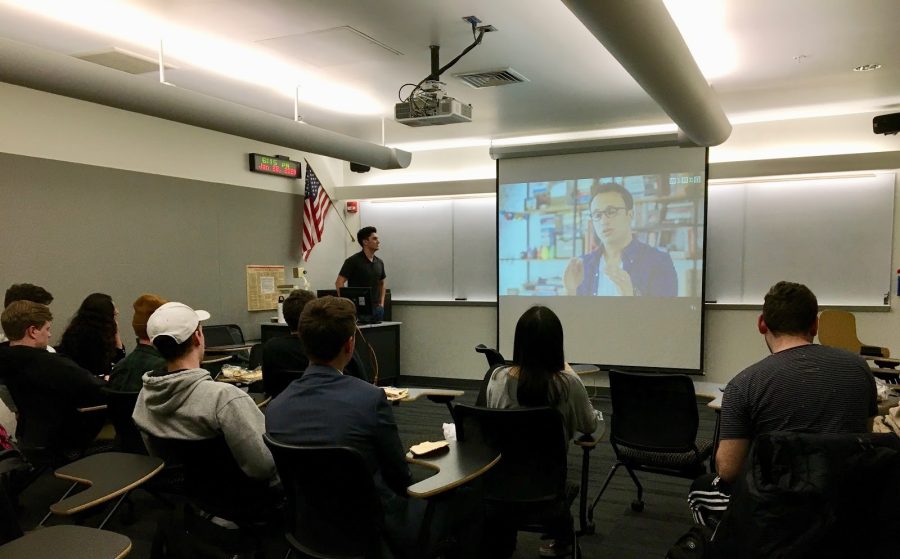Despite Israel’s recognition as a religious and cultural hub, it is also recognized by many as the Startup Nation in response to its ever growing entrepreneurial spirit. At the University of Arizona, a professional development club called UA Tamid involves students with the entrepreneurial atmosphere of Israel through connecting them to Israeli startups.
UA Tamid is a chapter of the Tamid Group, an organization with chapters throughout the U.S. and in some other countries as well. The Tamid Group connects students in college chapters to startups in Israel. At the UA Tamid, there are two tracks after basic education — the fund track and the consulting track. According to Rachel Greenberg, a UA Tamid chapter officer, most students get involved in the consulting track.
“In the majority of chapters, most people are in the consulting track because Tamid actually gives you cases of real life companies, and you get to be in contact with these real companies in Israel,” Greenberg said.
RELATED: UA startup Botanisol Analytics won $1.5 million contract
Those involved with the consulting track for UA Tamid will be set up with Israeli startups next school year. Dani Neuberger, a UA Tamid chapter officer, describes that there is a wide spectrum of startups that students may end up being paired with.
“I have some friends that are in the club at [The George Washington University] and [University of Michigan] and they’ve done a lot with FinTech startups because Israel is really big in the tech industry,” Neuberger said. “But it could really be anything, which is kind of the cool part.”
In the fund track, students engage in investment strategizing. The Tamid Group typically provides chapters with a pool of funds, which can be used to invest in stocks and Exchange Traded Funds, according to Greenberg. Students collaborate to create successful tactics for investing and trading.
“You get to do research on different stocks and ETFs and you get to manage a pool of money and see the return of all of your investments and all of your trades over the semester,” Greenberg said. “You get real money to work with and you get to see the cause and effects of your trading decisions.”
Additionally, UA Tamid has held a variety of educational programs for students to learn about Israeli startup culture and different career tracks. According to Neuberger, some of these educational programs have included guest speakers such as people that have worked, lived and owned businesses in Israel.
“Bringing in some guest speakers was really helpful for our members and also just taught us a lot about how Israelis do business, their attitudes and things that may be normal for them but not normal for us,” Neuberger said.
RELATED: UA students helping the community through donation drives and 3D printed face masks
During this last school year, UA Tamid’s programming was highly reliant on educational programming because it was in the beta phase, or the phase before the club could be approved as an official chapter of the Tamid Group.
Neuberger explained that in order to be approved by the Tamid Group, UA Tamid had to take a series of steps, including raising $1,000 and hosting both consulting and investing competitions.
The investment competition was partly led by Greenberg, who used her knowledge of investing to educate the club on successful strategies. Then, over the course of six weeks, the group competed in investing through an online game on Market Watch.
Now, UA Tamid has been approved as an official chapter of the Tamid Group, according to Greenberg and Neuberger, and is in the process of being approved as an Eller-associated club within the Federation of Eller Student Organizations.
“I’m just really excited because now we get to begin doing the things that we really wanted to do with the club,” Neuberger said. “This year we get to start working with companies.”
So, why are these students so interested in the Israeli startup atmosphere? Greenberg explained that Israel’s startup culture is something unique. In fact, she said that it has the highest number of startups per capita.
Benjamin Gold, the president of Students Supporting Israel at UA, gave more insight into why Israel is considered the startup nation.
“Israel has been considered the startup nation, mainly in the past 20 to 30 years, due to its massive amount of startups, especially in high-tech industries,” Gold said. “In 2016 there were 4,750 entrepreneurial high-tech startups and that makes it second only to the U.S.”
He also explained that the U.S. and Israel have a very interconnected high-tech economy. Some examples of this are the Israeli tech startups that eventually become acquired by the U.S., such as CyberX, which was obtained by Microsoft, and Raytheon in Tucson collaborated with an Israeli firm and the Israeli Defense Force to develop the Iron Dome, a defense system in Israel designed to deflect incoming missiles from surrounding lands.
“Arizona and Israel had around $460 million worth of trade with each other in 2018,” Gold said. “That is definitely looking like it’s going to grow to, some people have estimates of a billion in the next five years.”
Drip systems, a major form of efficient irrigation capable of conserving 30 to 65% of water supplies in comparison to conventional irrigation, was invented in Israel. Drip irrigation has been adopted across Arizona.
According to a 2018 report produced by UA faculty, “drip irrigation is one of the most efficient ways to irrigate crops in the southwestern United States.”
RELATED: Why are so many fires ravaging the Southern Arizona wilderness?
Gold believes that as the world continues to become more globalized, having experience with the Israeli economy and its startup culture is beneficial.
“Israel is making businesses based on the future,” Gold said. “If you want to work for an American firm, like I’m sure a lot of Eller students will end up working for Facebook, Google, Twitter, etc., you will have to work on acquiring firms from places like Israel.”
UA Tamid gives students this opportunity by allowing them to collaborate with Israeli firms and learn about the landscape of Israeli startup culture. Besides the Israeli aspect, Greenberg believes that the club can be beneficial for students because of its experiential learning aspects.
“Tamid offers some great opportunities for students because you get to have real world experience,” Greenberg said. “A lot of clubs have professional development and networking opportunities which is great and we can offer that too, but in Tamid you can pretty much get real work experience.”
Follow Quinn McVeigh on Twitter















